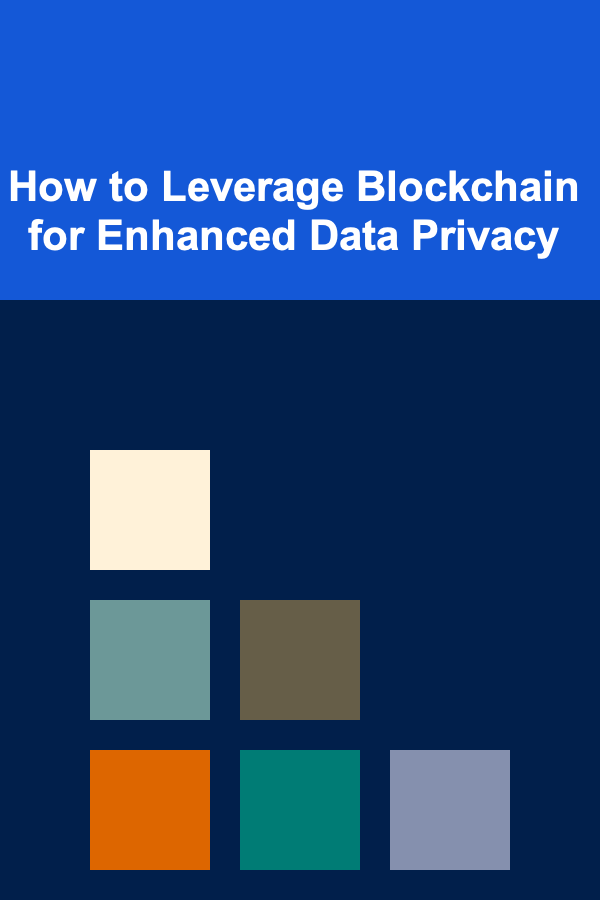
How to Leverage Blockchain for Enhanced Data Privacy
ebook include PDF & Audio bundle (Micro Guide)
$12.99$6.99
Limited Time Offer! Order within the next:

In the digital age, data privacy has become one of the most pressing concerns for individuals, businesses, and governments alike. With increasing reliance on digital platforms, the risks of data breaches, surveillance, and unauthorized access to personal information are ever-present. Traditional systems of data storage and management, often centralized, are vulnerable to cyber-attacks and unauthorized access. However, blockchain technology, originally designed for cryptocurrencies, has emerged as a promising solution to address these issues.
Blockchain's decentralized nature, coupled with its security features, offers a new paradigm for safeguarding data privacy. By leveraging the strengths of blockchain, individuals and organizations can ensure greater transparency, security, and privacy when handling sensitive data. In this article, we will explore how blockchain can be used to enhance data privacy, the key benefits it offers, and how it is being implemented in real-world applications.
Understanding Blockchain and Its Role in Data Privacy
Blockchain is a decentralized, distributed ledger technology that allows data to be stored across a network of computers, or "nodes," in such a way that it becomes immutable and transparent. This means that once data is recorded on a blockchain, it cannot be altered or tampered with without the consensus of the majority of participants in the network.
Key Features of Blockchain for Data Privacy
- Decentralization: Unlike traditional databases that rely on a central authority to manage and control data, blockchain operates on a peer-to-peer network. This decentralization makes it much harder for any single entity to control or manipulate the data, reducing the risk of breaches and unauthorized access.
- Immutability: Once a transaction or piece of data is added to the blockchain, it is cryptographically linked to previous data. This makes it extremely difficult to alter or delete information, ensuring the integrity of the data.
- Encryption: Blockchain uses advanced cryptographic techniques to ensure that data is secure. Each transaction is encrypted with a private key, making it readable only by authorized parties. This helps protect the privacy of sensitive information, even in a decentralized environment.
- Transparency and Auditability: While blockchain allows for privacy through encryption and pseudonymity, it also offers transparency. All transactions are recorded on the blockchain, making it easy to audit and trace data flows without compromising user privacy. This feature helps build trust among participants.
- Smart Contracts: Smart contracts are self-executing contracts with the terms of the agreement directly written into code. These contracts can automate processes and enforce privacy policies, ensuring that data is shared or accessed only under specific conditions.
The Need for Enhanced Data Privacy
In today's world, personal data is a valuable asset. From online shopping to social media interactions, every action leaves behind a trail of personal information. This data can be exploited in various ways, including identity theft, targeted advertising, or even surveillance. The increasing number of data breaches, such as those affecting major corporations and governmental bodies, highlights the vulnerability of personal information in centralized systems.
The European Union's General Data Protection Regulation (GDPR) and similar privacy laws across the world underscore the need for businesses to take responsibility for the privacy of their users. Blockchain presents an innovative way to tackle the challenges posed by traditional, centralized data management systems. It enables individuals to regain control over their personal data and ensures that organizations can manage it with transparency and accountability.
How Blockchain Enhances Data Privacy
1. User-Controlled Data Management
One of the key advantages of blockchain technology is that it allows users to have greater control over their personal data. In a traditional centralized system, organizations store vast amounts of personal data, often without users having full awareness or control over what is done with it. Blockchain, on the other hand, allows users to store and manage their data on their own terms.
Through decentralized applications (dApps), users can maintain full control over their personal information, choosing who can access it and under what conditions. For example, a user could share their health records with a medical provider, but only under strict conditions defined by a smart contract. This reduces the risks of data misuse and unauthorized access, as the user remains in charge of their information at all times.
2. Data Encryption and Privacy Preservation
In traditional centralized databases, data is often stored in a manner that makes it vulnerable to hacking or unauthorized access. Even if the data is encrypted, the centralized nature of the system creates a single point of failure. Blockchain technology mitigates this risk by decentralizing data storage, making it much harder for hackers to breach the system.
Furthermore, blockchain employs advanced cryptographic techniques to ensure that data is encrypted both in transit and at rest. For example, in some blockchain implementations, users' personal information is stored in a hashed form, making it unreadable to anyone who does not have the correct decryption key. This ensures that even if an attacker gains access to the blockchain, the data remains secure.
3. Immutable and Transparent Data Records
Once data is recorded on the blockchain, it becomes immutable---meaning it cannot be changed or deleted. This feature plays a crucial role in ensuring the integrity of data. When it comes to privacy, immutability provides a way to ensure that sensitive data cannot be tampered with, whether for malicious purposes or accidental errors.
The transparency of blockchain allows users to audit how their data is being used. For example, if a company collects personal data, the blockchain can show exactly what information was shared, when it was shared, and with whom. This provides an extra layer of accountability, as users can track how their data is being handled at all times. Moreover, businesses can prove compliance with data protection regulations by providing an immutable record of consent and data usage.
4. Decentralized Identity Management
Blockchain technology enables the creation of decentralized digital identities, which can be used to authenticate users and manage access to sensitive data. Traditional identity management systems rely on centralized authorities, such as government agencies or corporations, to verify identities. These centralized systems are often susceptible to data breaches and identity theft.
Blockchain-based identity solutions, on the other hand, allow individuals to create their own digital identities, which are stored on the blockchain in a secure and tamper-proof manner. These identities can be used for authentication without the need for a central authority, reducing the risk of unauthorized access and identity theft. Additionally, blockchain-based identities can provide greater privacy, as individuals can control which aspects of their identity are shared and with whom.
5. Smart Contracts for Privacy-First Agreements
Smart contracts can be used to automate privacy-centric agreements. These self-executing contracts can include terms and conditions related to data privacy, such as who can access specific data, under what conditions, and for how long. This ensures that privacy policies are enforced automatically, reducing the risk of non-compliance or data misuse.
For example, a user might enter into a smart contract with a company, granting them access to certain data only if specific conditions are met, such as the company providing an encrypted copy of the data or deleting it after a set period. This type of automation streamlines the process of data sharing while ensuring privacy and compliance with privacy laws like GDPR.
Real-World Applications of Blockchain for Data Privacy
1. Healthcare
Blockchain has the potential to revolutionize the healthcare industry by enhancing data privacy and improving the management of medical records. In traditional healthcare systems, patient data is often stored in centralized databases, which can be vulnerable to breaches. Blockchain can provide a more secure and transparent way of managing medical records, allowing patients to retain control over their data while sharing it with healthcare providers as needed.
In this system, patients could grant access to their medical records via smart contracts, ensuring that only authorized medical professionals have access to the information. Additionally, the immutable nature of the blockchain ensures that the medical records cannot be altered, providing an accurate and trustworthy history of the patient's health.
2. Finance
In the financial sector, blockchain can enhance privacy by allowing users to maintain control over their personal and financial data. Blockchain-based solutions can be used for secure, anonymous transactions while reducing the risk of fraud and unauthorized access to sensitive financial information.
For example, blockchain could be used to implement decentralized financial (DeFi) systems, where users can manage their financial activities without relying on centralized banks. Smart contracts can be used to enforce privacy rules in these systems, ensuring that sensitive financial data is only shared with authorized parties and under specific conditions.
3. Supply Chain Management
Blockchain is also being used to improve transparency and privacy in supply chain management. By recording transactions on an immutable blockchain, companies can track the provenance of goods and ensure that data related to the supply chain is accurate and tamper-proof. Blockchain can help ensure that sensitive data related to suppliers, pricing, and product specifications remains secure, while still allowing authorized parties to access the information when needed.
4. Voting Systems
Blockchain has the potential to improve the privacy and security of voting systems. By using blockchain to record votes, election results can be made transparent and tamper-proof, ensuring that the voting process is fair and accurate. Furthermore, blockchain-based voting systems can provide privacy for voters by allowing them to cast their votes anonymously while still ensuring that their vote is counted accurately.
Conclusion
Blockchain technology offers a transformative approach to data privacy, addressing many of the shortcomings of traditional, centralized systems. By decentralizing data storage, ensuring immutability, and leveraging cryptographic techniques, blockchain enhances the security, privacy, and transparency of personal data. As more industries and organizations begin to adopt blockchain, we can expect to see greater control over personal information and more robust privacy protections in the digital age. Through innovative applications such as decentralized identities, smart contracts, and encrypted data storage, blockchain has the potential to reshape the way we manage and protect our most sensitive data.

How to Invest in Mutual Funds for Steady Portfolio Growth
Read More
How to Rebalance Your Investment Portfolio Regularly
Read More
How to Optimize AR for Outdoor Use
Read More
How to Manage Children's Fears of the Dark
Read More
Choosing the Best Magnetic Window Cleaner for Double-Paned Windows: A Comprehensive Guide
Read More
How to Rent Your First Apartment: A Beginner's Checklist
Read MoreOther Products

How to Invest in Mutual Funds for Steady Portfolio Growth
Read More
How to Rebalance Your Investment Portfolio Regularly
Read More
How to Optimize AR for Outdoor Use
Read More
How to Manage Children's Fears of the Dark
Read More
Choosing the Best Magnetic Window Cleaner for Double-Paned Windows: A Comprehensive Guide
Read More